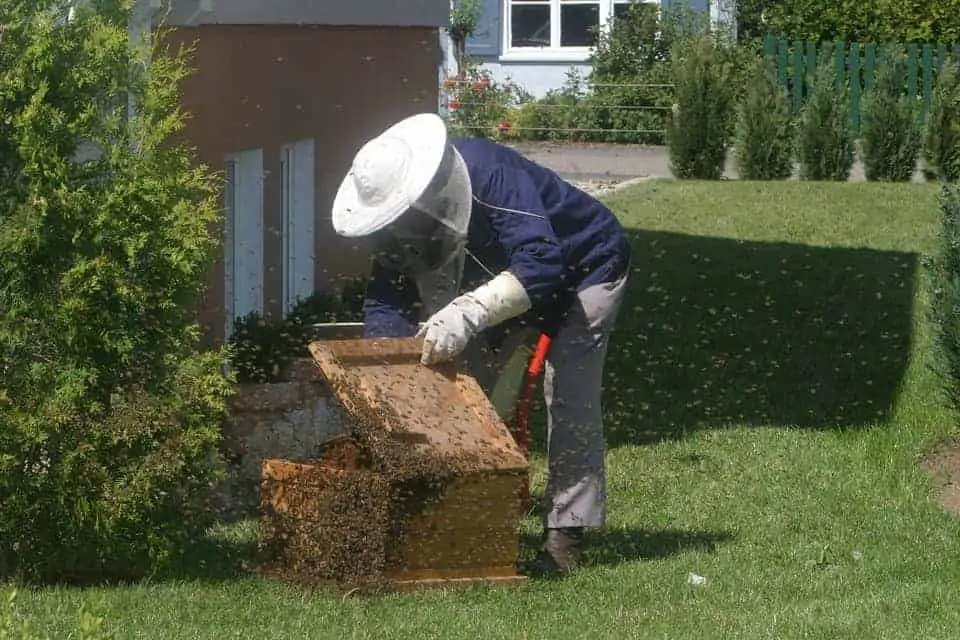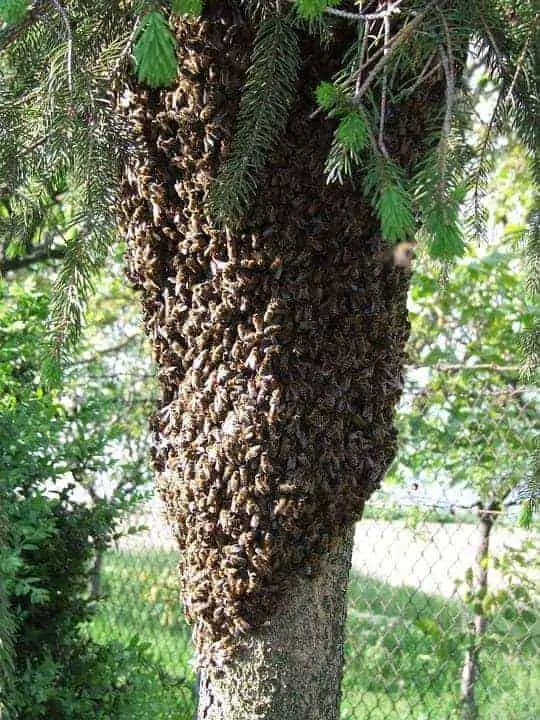Urban beekeeping. Is there really even such a thing?
Why yes, yes there is. And it is on the rise, just like urban farming. People are curious how to raise their own food including honey.
Not to mention, bees have a lot of other holistic properties that help humans maintain good health. They help boost garden production as well.
Bottom line, they are very helpful little creatures and that makes people want to have them around.
Sound interesting? Well, it is and this is how you get started on your journey of becoming an urban beekeeper.

What Exactly Is Urban Beekeeping?
Urban beekeeping is the act of keeping bees in an urban setting. It is sometimes referred to as backyard beekeeping or hobby beekeeping.
Those who are urban beekeepers usually only keep a few hives versus those who keep bees in a more rural setting. It also requires a little more forethought.
Just because keeping bees in the city is different doesn’t mean it isn’t just as enjoyable and functional.
Keeping It Legal, Keeping it Friendly
Check local ordinances
It is important to check so you don’t waste all of the time and money to start this adventure only to find out you have to shut it all down.
When keeping bees in an urban area the number one priority is to make sure that there are no local ordinances against raising bees in your area. Yes, in some areas it may actually be illegal to raise bees in your backyard. But don’t let that distract you before you decide – for many beekeepers there are no such restrictions.
Talk to your neighbors
In keeping the peace with the neighbors, it might be an idea to create pamphlets with information about all of the benefits bees provide and hand them out to your neighbors. They might be more inclined to be okay with your decision if they know all of the great benefits bees provide.
So allowing them to know ahead of time is important. Besides, you never know if one of your neighbor’s has an allergy to bees. This would give you all time to discuss these issues upfront and before you have made the investment.
In a small environment, such as an urban setting, it is generally important to let your neighbors know of your intentions to raise bees. A lot of people are very afraid of bees because they are automatically associated with bee stings and good communication can be important here.
However, all this is dependent on your specific scenario and setting. For those with a larger space, where it has been determined that there are no legal issues and where your bees are expected to have little to no impact on the neighbors, a “shout from the rooftops” approach may not be necessary or wise.
Let common sense and empathy with your neighbors and plain, old-fashion good manners guide your decision.
Location, Location, Location (and Water!)
When considering their location, you must consider three things: suitable access for your bees, a wind break, a shady spot with dabbled sunlight and a water source. Let’s look at each of these.
Bee Air Traffic Control
If your fence is quite low, then your bees will potentially take off, fly and land right at eye level for the average person. This could encourage them to sting which could equate to issues between you and your neighbors.
One option is to install a fence, which adjusts the “flight path” of your bees. In short – get them high, quick! An 8 foot tall fence would generally do the trick. This encourages your bees to fly out from the hive at a high level and back over your neighbors’ heads.
Avoiding Winds
They will also require a windbreak. This could be your fence or a tree line. Either way, you need something there to protect the hives from toppling over in case of large, gusty winds.
Early Sun, Late Comfort
You will need to find a spot in your backyard where the bees will have shade so they don’t get too hot but also enough sunlight to keep them wanting to move. Otherwise, they’ll get lethargic which means less honey for you. The best way to assess this is to check the shade pattern through the day before you buy and position your hive.
Generally, you want early morning sun to encouraging to start and then late afternoon shade, to give your bees a break from the scorching sun. On a hot day, your bees will work really hard to keep the hive cool. Give them a helping hand.
A need for water source
If you don’t have a great water source nearby, you can always purchase a fountain or birdbath and use that. Of course, all bees need water. However, most urban beekeepers don’t have a great water source in their backyard. And if bees need to go and find water they will do just that. That might be your neighbors’ swimming pool with all those kids running around. That’s a problem!
It simple and sensible to make sure your bees have a water source. It saves them a lot of effort and, potentially, your neighbors a lot of anguish.
The Proper Gear
When keeping bees, you need proper gear.
I don’t care where you are located or how many hives you have. People can be brave all they want to and go into their bees without gear. In my mind, they are glutton for punishment. Don’t expose yourself to be harmed if you don’t have to. Bees usually only sting if they feel they are threatened, but you never really know when that will be exactly.
So be safe. Buy a bee suit, hat with veil, gloves, and a smoker. Or, if that is too much, at least protect your upper body with a jacket and veil. And be sure to order these items prior to actually having your bees. Safety matters, especially when you are raising bees.
Beyond safety, also consider comfort. Beekeeping gear today is a marvel that can protect from stings while also being ventilated. On a hot, summer day ventilated gear allows you to focus better on your bees!
Obtaining Your Bees
Buy gentle bees
You can order your bees online or from a local beekeeper. It is your choice. although PerfectBee generally recommends locating bees locally. However, I will say this, living with hostile bees will suck the enjoyment right out of beekeeping. Your neighbors won’t be happy either.
So be sure when you buy that you seriously consider temperament. Italian and Russian bees, for example, are well known for being relatively calm.
When purchasing bees make sure that you discuss their temperament with whomever you choose to purchase them from.
Start with only two nucs
Bees split fairly quickly depending upon genetics. So though you may only start with two nucs, you’ll probably end the season with 4 or more.
If it tells you anything, we started our season with 4 hives and are now up to 10 only weeks later. So just don’t get ‘bee happy’ when purchasing them. They are great creatures that multiply quickly. This will, of course, depend on the space available – but just know ahead of time that they do indeed grow quickly!
Staying On Track
Check your hives regularly
Bees will multiply quickly if you have a good queen. With this being said, you need to check your hives regularly.
The reason is because if she runs out of room to lay then she will leave, along with thousands of her offspring! This is called a swarm. She will lay another queen and take part of the hive and leave. This is a natural process, but you want to actually split them before this happens so you don’t lose bees.
So checking your bees regularly is important. This will also help you to stay on top of things in the event you have issues within your hive like robbers or pests.
Swarms and your neighbors
Talking of swarms, the swarm season is usually in spring. This is when the bees come out of the hive from the cold and get moving. Ideally, your queen will start laying like crazy.
This goes back to my previous point of checking your hives regularly. If you do not and the bees swarm it is very possible they will swarm to your neighbors’ homes. You really want to avoid swarms if at all possible, especially in a tight-knit urban environment.
The upside is that you can usually get them back by spraying them with sugar water and knocking them back into a nuc. They are also usually less defensive since they don’t have a hive to protect.
However, your neighbors might not be too happy to have a large swarm of bees gathered in an unexpected area around their home. So you need to be sure to watch your bees carefully during these seasons. You also need to stay in contact with your neighbors and educate them about bees swarming. And then take steps to avoid swarms. That’s a whole topic PerfectBee will cover in due course!
Raising bees is an enjoyable task. However, there are challenges. Raising them in close quarters in an urban setting creates a few extra hurtles, but they are often easy to overcome. So just be sure to educate yourself before you decide to jump into urban beekeeping.

